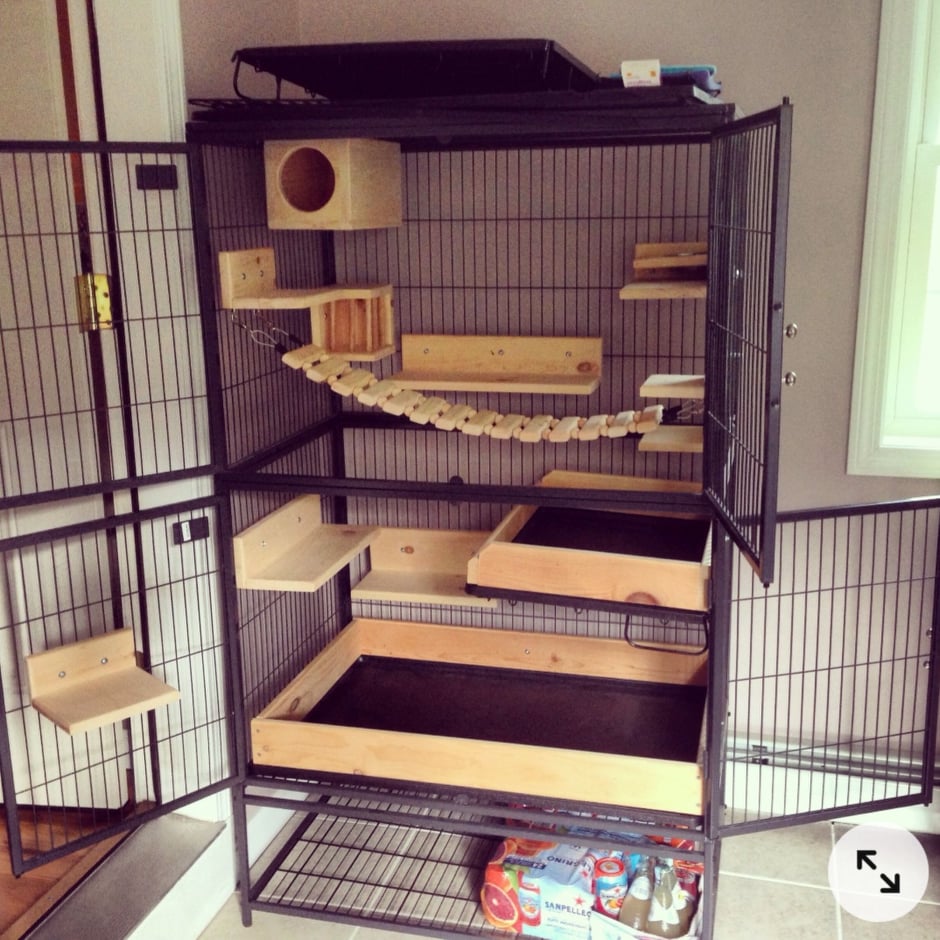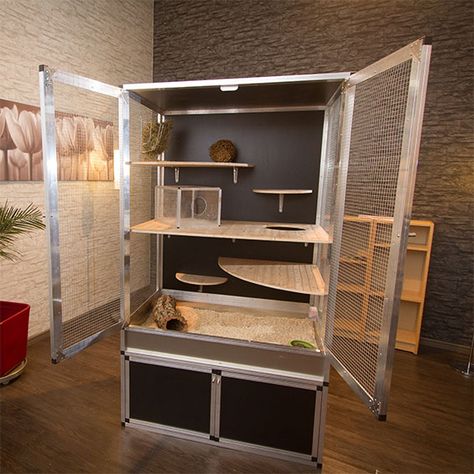General Information:
Domesticated degus are scientifically known as Octodon degus, but they're informally referred to as the common degu or bush-tailed rats. They're semi fossorial Caviomorphs native to Northern and Central Chile; found in the Andes slopes up to 1200m. They usually live between 6-8 years in captivity, although ages up to 10-13 years have been reported.
Degus usually live in groups referred to as ‘herds’. As a small but vocal rodent, you'll frequently hear degus ‘chatting’ to their companions – sometimes even their owners too. The more experienced you become, the more you’ll recognise their different calls – ‘degu language’ can be difficult to understand but not impossible.
Useful Links:
Care:
Housing/Enrichment:
Their cage should have plenty of height and be made entirely from metal to prevent them from gnawing out of their cage.
Degus are highly intelligent, active rodents and require a lot of mental stimulation. Therefore, the cage should be as large and enriched as possible.
Provide a suitable wheel, branches, ropes, wooden shelving, hammocks, and nesting areas such as chinchilla boxes and other secure housing. As prey animals, they can become stressed without a 'safe-space' to retreat to.
Providing your degus with soft and clean bedding can help prevent common foot issues from occurring. We currently use hemp bedding for our degus. Consider providing a pretty deep layer of substrate, as degus do enjoy digging.
The ideal temperature for degus is roughly 21°C, try to avoid excessive humidity levels.
Useful Links:
Domesticated degus are scientifically known as Octodon degus, but they're informally referred to as the common degu or bush-tailed rats. They're semi fossorial Caviomorphs native to Northern and Central Chile; found in the Andes slopes up to 1200m. They usually live between 6-8 years in captivity, although ages up to 10-13 years have been reported.
Degus usually live in groups referred to as ‘herds’. As a small but vocal rodent, you'll frequently hear degus ‘chatting’ to their companions – sometimes even their owners too. The more experienced you become, the more you’ll recognise their different calls – ‘degu language’ can be difficult to understand but not impossible.
Useful Links:
Care:
Housing/Enrichment:
Their cage should have plenty of height and be made entirely from metal to prevent them from gnawing out of their cage.
Degus are highly intelligent, active rodents and require a lot of mental stimulation. Therefore, the cage should be as large and enriched as possible.
Provide a suitable wheel, branches, ropes, wooden shelving, hammocks, and nesting areas such as chinchilla boxes and other secure housing. As prey animals, they can become stressed without a 'safe-space' to retreat to.
Providing your degus with soft and clean bedding can help prevent common foot issues from occurring. We currently use hemp bedding for our degus. Consider providing a pretty deep layer of substrate, as degus do enjoy digging.
The ideal temperature for degus is roughly 21°C, try to avoid excessive humidity levels.
Useful Links:
- www.petplanet.co.uk/p28577/rat_and_ferret_cage_by_petplanet.aspx?ptm_source=google&ptm_medium=shopping&ptm_campaign=40to50_68616&campaign=439957091&adgroup=33472599131&keyword=&gclid=CjwKCAjw_o-HBhAsEiwANqYhp093UDoXJp79SJ0HXEFKKP7e_y2PLiAv8SY28EBP8V1ajjJH3Nf7ZBoC4B0QAvD_BwE
- www.littlepetwarehouse.co.uk/products/metal-aventura-huge-metal-rat-ferret-chinchilla-cage.html?gclid=CjwKCAjw_o-HBhAsEiwANqYhp-SRFfG5vZiPD7Qo_A8jukNG-YvIZQ5nzQ8Ph55VlCo981gCPEZvHBoCceEQAvD_BwE
- minipetz.co.uk/
- www.tictacwheels.co.uk/shop
- www.rvc.ac.uk/Media/Default/Beaumont%20Sainsbury%20Animal%20Hospital/documents/Caring-for-your-degu%20Oct%202019.pdf
- lafeber.com/vet/basic-information-for-degus/
Diet:
Degus have complex dietary needs; they are herbivores: they're anatomically and physiologically designed to eat plant-based materials.
The most important part of your degu's diet is hay as it provides them with fibre and gnawing material. The should have unlimited access to grass hays such as timothy and/or meadow hay.
Degus enjoy a wide variety of dried flowers/leaves/herbs as a healthy treat; degus will ingest 60% herbaceous foliage in the wild.
The final part to a degu's diet is their pellets. Fortunately, degu pellets are easily accessible online or in-store. An ideal degu pellet should contain high amounts of vitamin C, high amounts of fibre, and low sugar.
Your degu may also eat their own faeces; this is normal and essential behaviour called coprophagy. This allows them to extract the highest amount of nutrients from their diet.
Degus are prone to developing spontaneous diabetes mellitus and amyloidosis, as their physiology makes them intolerant to dietary sugars. Feeding your degu a high-roughage diet with no high-sugar treats will help prevent the disease and keep your degu in good health.
Useful Links:
Socialising:
Unlike many rodents, degus are diurnal, meaning they’re most active during the day. This means you’ll get plenty of opportunities to socialise with your degu. Many aren't particularly easy to handle, but they can form incredibly strong bonds with their owners.
Degu companionship is one of the more difficult topics to discuss, as they form incredibly strong social organisations and each degu has their own unique personality. Although, we will mention a few common factors which apply to most degus:
Lone degus can become extremely attached to their owner and can build a very strong bond. Degus can adjust to living happily on their own, however, we think all avenues should be considered before you make a decision. Remember, they're highly social creatures.
Bathing:
Degus need to maintain their coat. In the wild, degus will manage their coat condition with sand baths. In captivity, it's still important to help your degu maintain their coat.
Provide your degus with a suitable dust/sand bath for approximately 20 minutes, 3 times a week. You can buy suitable bathing sands and dusts online and instore.
Never:
Useful Links:
Common Diseases:
Degus are prone to a wide-range of diseases; many of which are husbandry related. It’s really important that you’re aware of the issues that can occur, why they occur, and how to prevent them from presenting in your pet (prevention is better than cure):
Please feel free to ask further questions.
Degus have complex dietary needs; they are herbivores: they're anatomically and physiologically designed to eat plant-based materials.
The most important part of your degu's diet is hay as it provides them with fibre and gnawing material. The should have unlimited access to grass hays such as timothy and/or meadow hay.
Degus enjoy a wide variety of dried flowers/leaves/herbs as a healthy treat; degus will ingest 60% herbaceous foliage in the wild.
The final part to a degu's diet is their pellets. Fortunately, degu pellets are easily accessible online or in-store. An ideal degu pellet should contain high amounts of vitamin C, high amounts of fibre, and low sugar.
Your degu may also eat their own faeces; this is normal and essential behaviour called coprophagy. This allows them to extract the highest amount of nutrients from their diet.
Degus are prone to developing spontaneous diabetes mellitus and amyloidosis, as their physiology makes them intolerant to dietary sugars. Feeding your degu a high-roughage diet with no high-sugar treats will help prevent the disease and keep your degu in good health.
Useful Links:
- BSAVA Manual of Exotic Pets (fifth edition)
- www.degutopia.co.uk/degudiet.htm
Socialising:
Unlike many rodents, degus are diurnal, meaning they’re most active during the day. This means you’ll get plenty of opportunities to socialise with your degu. Many aren't particularly easy to handle, but they can form incredibly strong bonds with their owners.
Degu companionship is one of the more difficult topics to discuss, as they form incredibly strong social organisations and each degu has their own unique personality. Although, we will mention a few common factors which apply to most degus:
- Most degus prefer companionship.
- Mild bickering between herd-members is normal.
- Pay attention to any abnormal behaviour, particularly escalating aggression. Minor injuries can be normal and injuries can be accidental. Monitor the behaviour closely.
- Avoid pro-longed separation wherever possible. If your degus have to be separated for days, gradual introductions will be required as your degus may behave aggressively towards each other if suddenly reintroduced.
Lone degus can become extremely attached to their owner and can build a very strong bond. Degus can adjust to living happily on their own, however, we think all avenues should be considered before you make a decision. Remember, they're highly social creatures.
Bathing:
Degus need to maintain their coat. In the wild, degus will manage their coat condition with sand baths. In captivity, it's still important to help your degu maintain their coat.
Provide your degus with a suitable dust/sand bath for approximately 20 minutes, 3 times a week. You can buy suitable bathing sands and dusts online and instore.
Never:
- Use play sand in your degus dust bath
- Use building sand in your degus dust bath
- Bathe your degus in water.
Useful Links:
- www.amazon.co.uk/JR-Farm-Chinchilla-Sand-Special/dp/B001MZWT5G
- www.petsathome.com/shop/en/pets/bathing-dust-for-chinchillas-3kg?weight=3kg?utm_source=google&utm_medium=cpc&utm_campaign=google_shopping&cm_mmc=Google-_-CPC-_-%20google_shopping-_-google_shopping&ita=1976&ito=google_shopping&istCompanyId=7255ccad-a1fc-4729-af31-478f79e5071c&istFeedId=385e6b9a-8b03-4076-a8bb-e4737df8549c&istItemId=itxmxptil&istBid=tzwt&gclid=CjwKCAjw_o-HBhAsEiwANqYhp1tghXKXZcprhV5K3_QE7nlvpRCY68PT6U9M1Jnm1qKA2OMS3gIOohoCaCUQAvD_BwE&gclsrc=aw.ds
Common Diseases:
Degus are prone to a wide-range of diseases; many of which are husbandry related. It’s really important that you’re aware of the issues that can occur, why they occur, and how to prevent them from presenting in your pet (prevention is better than cure):
- Dental disease: All of the degus teeth grow continuously. The incisors are naturally orange, whereas the molars are cream. Their teeth are well equipt to deal with their natural diet consisting of high amounts of abrasive and fibrous grasses. A diet high in pellets will not wear down all the teeth effectively and will lead to dental diseases.
Many dental diseases have been documented in degus such as malocclusion, odontomas, caries, tooth resorption, and periodontal and endodontic diseases.
Symptoms of dental disease in degus include; ptyalism (drooling), anorexia (not eating), watery eyes (particularly when tooth root elongation occurs), and weight loss secondary to anorexia. It’s vital these issues are addressed urgently as dental disease can be fatal if left untreated. - Diabetes Mellitus: Degus have been documented to have a divergent insulin structure which impacts blood glucose regulation, making them extremely prone to diabetes. Symptoms will include: cataracts (usually within 4 weeks), polyuria and polydipsia (increased fluid intake and urination), gluclosuria, and weight loss. It’s important you correct your husbandry as there are reports that insulin trials have not been successful as it is primarily a non-insulin dependent form of diabetes mellitus (Quesenberry and Carpenter, 2004).
- Traumatic Injuries: Traumatic injuries as a result of fighting with cage mates are not uncommon, especially with very large groups; barbering, lacerations, tail injuries and other bite wounds are very common when a herd is fighting. If severe injuries occur, it’s best to separate the fighting degus.
- Pododermatitis: Pododermatitis basically describes ulcerated lesions on the feet, which are almost always the result of incorrect husbandry; diet/obesity, improper and unsanitary housing etc. The feet/plantar surfaces will appear swollen, and may even be infected causing a lot of pain to the degu. Necrotic tissue may need to be surgically removed and medication from your vet will need to be prescribed. It’s important you degu stays a healthy weight with a proper diet and that your housing is to standard.
Please feel free to ask further questions.


